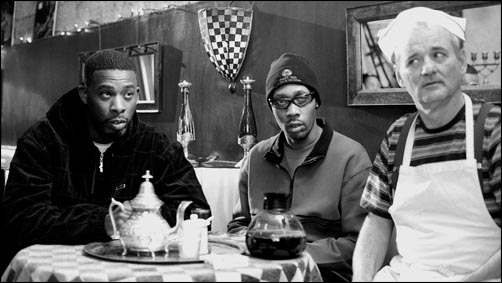
In 1986 film maker Jim Jarmusch gave up coffee, presumably why he started obsessing over in it a series of short black-and-white vignettes spanning seventeen years, all collected under the title Coffee and Cigarettes (2003, 93 mins). The premise of the eleven pieces is basically that people sit down at a table and chat. Those involved are drawn from the worlds of music, film, and art; while the subjects they cover leap around, sometimes cross-pollinating across sketches, revolve around dreams, Tesla coils, and of course coffee and cigarettes.
The first, Strange To Meet You, a skit featuring alternative comedian Steven Wright and Roberto Benigni, was originally shot for Saturday Night Live back in 1986. Mismatched in the sense that one is laidback while the other is hyperactive, they are perfectly matched here as two men (with five cups of coffee!) who meet, chat a little about coffee, cigarettes, and exchange a dentist appointment. As a standalone piece — the second, Twins, wouldn’t be shot until 1989 — not much actually happens and nothing is explained. They meet, seemingly arranged, and then go their separate ways. The moment between contrasts the way that coffee affects them. Benigni’s hands shake, he asks non-sequiteurs; Wright is relaxed, if bewildered, throughout.
How can such different reactions come from the same source? Contrasts, therefore, are at the heart of these sequences. Each table shows a chessboard pattern, and the cinematography beautifully captures every instance of black and white, be it the black coffee in white mugs or the black spots on the white dice in No Problem, an intentionally drawn out scene where Isaach De Bankolé‘s repeated questioning of Alex Descas‘s situation gets rebuffed by the assurance that there’s no problem. The chessboard perhaps implies a level of competition between the people involved; the lack of pieces a permanent stalemate.
While some pieces riff on the same themes (Joseph Rigano berates Vinny Vella for his lunch consisting only of cigarettes and coffee, as does Taylor Mead to Bill Rice in the poignant closing story) and perhaps contain subtle points, there are those that are more blatant in their delivery. In Cousins, Cate Blanchett takes on two roles, a version of herself and a fictional cousin. While Cate has all the trappings of celebrity — of which her cousin will never know — she seems eager to please while feigning interest. When we see her hand over a gift of expensive perfumes, we see the irony of a world where the rich can afford everything but are instead gifted it while the poor can only hope to one day afford it.
Attitudes also play a role as the no-smoking hotel lobby where Cousins takes place delivers an unmistakeable case of double standards. These rear their ugly head again in the similarly titled Cousins?, where Alfred Molina and Steve Coogan, over cups of tea, discuss their shared heritage, thanks to the former’s genealogical research. Coogan barely wants to know until Molina gets a phone call that could lead to work. It’s a wonderful scene, nicely played, and the humour comes mostly from Coogan’s disrespectful take on himself, blatantly dismissing Molina’s career while his own is in the ascendance.
Humour comes again in Delirium, with the appearance of Bill Murray, (playing Bill Murray, who else?) working in some cafeteria and not wanting anyone to know. As he swigs coffee from the cafetière the conversation with the Wu Tang Clan‘s GZA and RZA touches on the dangers of both nicotine and caffeine. On learning that nicotine is used in insecticide Bill Murray asks “It’s good if it kills bugs, right?”, his typical deadpan inspiring more laughter than it really should. Notably here the scene recalls both Strange To Meet You and the short Palme d’Or winning, Somewhere In California, where Iggy Pop and Tom Waits cover the topic of quitting one’s addictions, when a refrain about medicine and music is played again.
In Jack Shows Meg His Tesla Coil, we see musician Jack White do jus that and the phrase “Nikola Tesla perceived the earth as a conductor of acoustical resonance” makes its first appearance. Some degree of its meaning is perhaps in the echoes that appear throughout the tales of coffee and cigarettes, bringing some form of unity. To this end the first few shorts do seem separate from the rest, no doubt because the wider picture had not yet been conceived, but the later episodes make up for this and ensure interconnectedness. The effect is one of wondering where one scene, while having no physical relation to any other, will lead.
The scenes may tackle different areas of conversation, but they all, in some way, cover how coffee and cigarettes are everyday obsessions that people seem unable to function without. In focusing on these, Jarmusch perhaps opens the world up to other obsessions hidden away — gambling, fame, and conspiracy theory, for example. We see Alex Descas confident in his dice, Steve Coogan kick himself at a missed opportunity, and Jack White note how “they” tried to discredit Tesla. These are perhaps bigger, more difficult topics that can play with the psyche and require discussion, but we ignore these as, like the conversations herein, the banal is easier to digest and it enthrals us more.

I thought the film was a bit hit an miss, man, but the Tom Waits/Iggy Pop segment was a work of pure class.
I know what you mean about it being hit and miss. I could have done without a few of them. I expect when he started, there was little intention to turn it into something bigger…and then, when that time came, there were a few a little rushed.